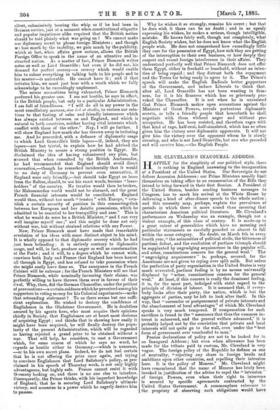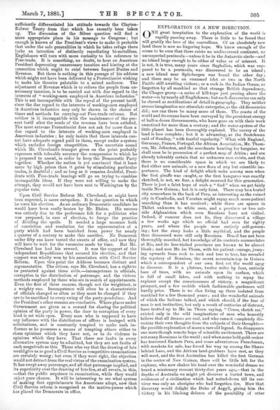MR. CLEVELAND'S INAUGURAL ADDRESS.
HAPPILY for the simplicity of our political style, there is nothing in England answering to the inauguration of a President of the United States. Our Sovereigns do not
deliver Accession Addresses ; our Prime Ministers usually limit themselves on taking office to an enumeration of the Bills they intend to bring forward in their first Session. A President of the United States, besides sending business messages to Congress, has to mark his arrival at the White House by delivering a kind of after-dinner speech to the whole nation ; and this necessity may, perhaps, explain the prevalence of periods in which there is more sound than meaning that characterises American political literature. Mr. Cleveland's performance on Wednesday was an example, though not a violent example, of this class of oratory. It is made-up to a great extent of generalities which have no meaning and particular statements so carefully guarded as almost to fall within the same category. No doubt, on March 4th in every fourth year," the animosities of political strife, the bitterness of partisan defeat, and the exultation of partisan triumph should be supplanted by ungrudging acquiescence in the popular will, and sober, conscientious concern for the general weal." The " ungrudging acquiescence' is, perhaps, secured, for the Americans are not given to crying over spilt milk. But unless the perfection of party organisation in the United States is very much overrated, partisan feeling is by no means universally displaced by "sober, conscientious concern for the general weal." At least, if this concern is really the dominant feeling, it is, for the most part, indulged with strict regard to the principle of division of labour. It is assumed that, if everybody looks after their party, the nation, which is but the aggregate of parties, may be left to look after itself. In this way, that " surrender or postponement of private interests and the abandonment of local advantages" of which Mr. Cleveland speaks is very much tempered. If compensation for such sacrifices is found in the " assurance that thus the common interest is subserved, and the general welfare advanced," it is probably helped out by the conviction that private and local interests will not quite go to the wall, even under the "best form of government ever vouchsafed to man."
Precise declarations of policy are not to be looked for in an Inaugural Address ; but even when allowance has been made for the tribute paid to custom, Mr. Cleveland is very vague. The foreign policy of the Republic he defines as one of neutrality, "rejecting any share in foreign broils and ambitions upon other countries, and repelling their intrusion here. It is the policy of Monroe." Mr. Cleveland might have remembered that the name of Monroe has lately been invoked in justification of the advice to repel the " intrusion " of foreign Powers, even when their right to intervene is secured by specific agreements contracted by the United States Government. A commonplace reference to the propriety of observing such obligations would have
sufficiently differentiated his attitude towards the ClaytonBulwer Treaty from that which has recently been taken up. The discussion of the Silver question will find .a more appropriate place in his message to Congress ; but enough is known of the President's views to make it probable that under the safe generalities in which he takes refuge there lurks an intention of distinctly repudiating bi-metalliam. Englishmen will turn with more curiosity to his reference to Free-trade. It is something, no doubt, to hear an American President deprecating unnecessary taxation and hinting at the connection which ought to exist between Import Duties and Revenue. But there is nothing in this passage of his address which might not have been delivered by a Protectionist wishing to make his theories palatable to a mixed audience. The adjustment of Revenue which is to relieve the people from unnecessary taxation, is to be carried out with due regard to the interests of " working-men employed in American industries." This is not incompatible with the repeal of the present tariff, since the due regard to the interests of working-men employed in American industries may only be shown in the choice of times and methods for carrying-out Free-trade reforms. But neither is it incompatible with the maintenance of the present tariff after the needs of the revenue have been satisfied. The most extreme Protectionist does not ask for more than a due regard to the interests of working-men employed in American industries ; he only insists that these interests cannot have adequate regard paid to them, except under a system which excludes foreign competition. The uncertain sound which Mr. Cleveland's trumpet gives on the point probably expresses with tolerable accuracy the compromise to which he is prepared to assent, in order to keep the Democratic Party together. Whether the nation is yet convinced that it loses more by high prices than it gains by stimulating particular trades, is doubtful ; and so long as it remains doubtful, Presidents with Free-trade leanings will go on trying to combine incompatible ideas. If they were not willing to make the attempt, they would not have been sent to Washington by the popular vote.
Upon Civil Service Reform Mr. Cleveland, as might have been expected, is more outspoken. It is the question to which he 'owes his election. As an ordinary Democratic candidate he would have been easily beaten by Mr. Blaine. His success was entirely due to the preference felt for a politician who was prepared, in case of election, to forego the practice of dividing the spoils. It needed a large measure both of conviction and resolution for the representative of a party which had been banished from power for nearly a quarter of a century to make this sacrifice. No Democrat under fifty can have tasted the sweets of office, and now they will have to wait for the vacancies made by time. But Mr. Cleveland has had his reward. It was the support of the independent Republicans that secured his election, and that support was wholly won by his association with Civil Service Reform. Upon this point the Address becomes distinct and argumentative. The citizen, says Mr. Cleveland, has a right to be protected against three evils,—incompetence in officials, corruption in the distribution of patronage, and the vicious methods employed by those who are in search of appointments. Even the first of these reasons, though not the weightiest, is a weighty one. Incompetence will often be a characteristic of officials changed so often as they must be changed if they are to be sacrificed to every swing of the party-pendulum. And the President's other reasons are conclusive. Where places under Government are given as a reward for sharing the political opinion of the party in power, the door to corruption of every kind is set wide open. Every man who is supposed to have any influence with the distributors of offices is besieged with solicitations, and is constantly tempted to make such influence as he possesses a means of tempting others either to sham opinions which they have not, or to do violence to opinions which they have. That there are faults in every alternative system may be admitted, but they are not faults of such magnitude as this. Those who say that the drawing of lots would give us as good a Civil Service as competitive examinations are certainly wrong ; but even if they were right, the objection would not detract from the real virtue of the examination system. It has swept away patronage, and all that patronage implied, and its superiority over the drawing of lots lies, at all events, in this, —that the public acquiesce in examination, while they would reject pure chance. It will be interesting to see what system of making first appointments the Americans adopt, now that Civil Service reform is recognised as the motive-power which has placed the Democrats in office.















































 Previous page
Previous page